Overview
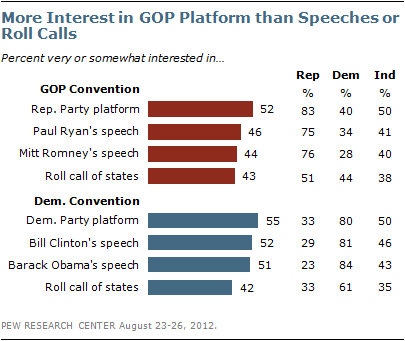
As the Republican convention gets underway, more Americans express interest in learning about what’s in the GOP platform than in the speeches by either Mitt Romney or his running mate. About half of the public (52%) is interested in learning about the Republican Party’s platform, while 44% are interested in Romney’s acceptance speech and about the same percentage (46%) in Ryan’s convention speech.
The latest survey by the Pew Research Center for the People and the Press, conducted August 23-26, 2012 among 1,010
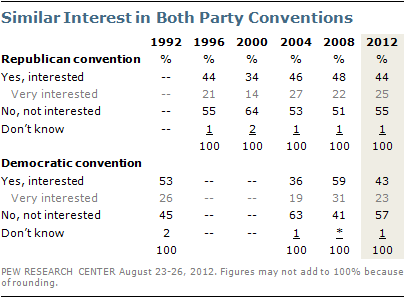
adults nationwide, finds overall interest in the Republican convention is comparable to the past two GOP conventions. More than four-in-ten (44%) say they are very or fairly interested in following what happens in Tampa over the next three days, compared with 48% on the eve of the 2008 GOP convention, and 46% in 2004.
This is almost identical to the level of public interest in next week’s Democratic convention in Charlotte; 43% say they are interested in what happens at that convention. This is down significantly from the notably high interest in the Democratic convention four years ago, when 59% were very or fairly interested. In terms of advance interest in events at the Democratic convention, 55% say they are interested in learning about the Democratic platform, while nearly as many express interest in Barack Obama’s acceptance speech (51%) and Bill Clinton’s convention speech (52%).
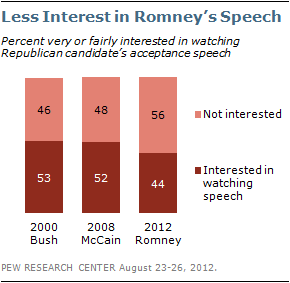
There is substantially less advance interest in Mitt Romney’s acceptance speech this Thursday than there was in John McCain’s acceptance speech in 2008 or George W. Bush’s in 2000. Just over half of Americans said they were interested in watching those speeches (52% in 2008, 53% in 2000). That compares to 44% this year.
Republican interest in Romney’s acceptance speech is as high as for McCain’s speech four years ago, or for Bush’s in 2000. However, Democrats are far less interested in hearing the Republican nominee’s speech this year than in the past, and independents’ interest is down as well.
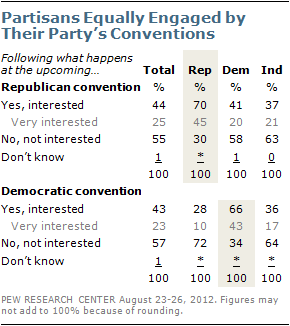
Each party’s base expresses similar levels of interest in following their party’s conventions; 70% of Republicans and 66% of Democrats say they are very or fairly interested in following their own party’s convention. Democrats are somewhat more interested in following the GOP convention (41%) than are Republicans in the Democratic convention (28%). Among independents, majorities are not interested in the Republican (63%) or the Democratic convention (64%).
August News Interest
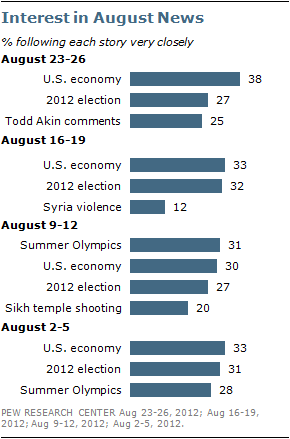
News about the economy continues to top the public’s news agenda. In the current survey, 38% say they are following reports about the condition of the U.S. economy very closely, compared with 27% who say they are following election news very closely.
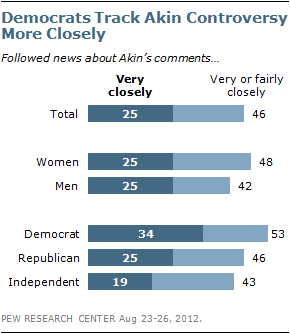
The controversial comments about rape and abortion made by Missouri Senate candidate Todd Akin drew limited public attention. One-in-four (25%) followed this story very closely, but another one-in-three (33%) say they did not follow this closely at all. Interest in the Akin controversy was most widespread among Democrats, 34% of whom followed this very closely, compared with 25% of Republicans and just 19% of independents. There was no significant gender gap in the amount of attention given to Rep. Akin’s comments. A quarter of women and men (25% each followed the story very closely.
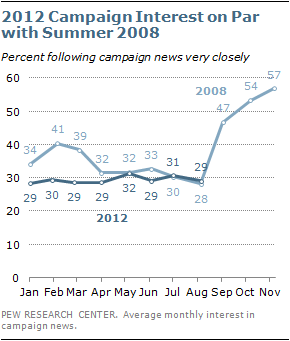
For the month of August, public interest in the 2012 campaign is on par with the summer of 2008. On average, over the past four weeks 29% of Americans say they have followed news about the presidential candidates very closely; 28% said the same in August of 2008. This is the fifth consecutive month in which 2012 campaign interest has been equal to interest in the 2008 campaign cycle.
In previous elections, public attention to campaign news has spiked in September, following the final party conventions. In 2008, the share following the election very closely jumped from 28% in August to 47% in September.